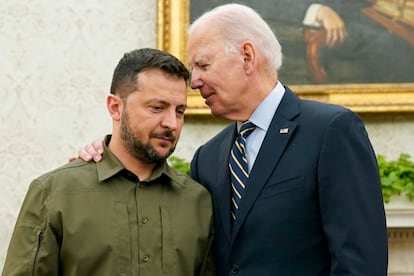Biden announces additional military aid for Ukraine as he meets with Zelenskiy at the White House
The new $325 million appropriation comes as Republican lawmakers in the House of Representatives are increasingly reluctant to approve assistance for Kyiv


The U.S. government increased its military commitment to Ukraine. On Thursday, at his meeting with the President of Ukraine, Volodymir Zelenskiy, at the White House, U.S. President Joe Biden announced a new shipment of military aid in the amount of $325 million to help the country fight the Russian invasion.
“Today, I approved the next tranche of US security assistance to Ukraine, including more artillery, more ammunition, more anti-tank weapons, and next week, the first US Abrams tanks will be delivered to Ukraine,” Biden announced following a private meeting alone with Zelenskiy, prior to the start of a second meeting, this time accompanied by their respective teams of advisors.
“We’re also focused on strengthening Ukraine’s air defense capabilities, to protect the critical infrastructure that provides heat and light during the coldest and darkest days of the year,” the U.S. president added. For his part, Zelenskiy expressed his appreciation for the new shipment of assistance, noting that it is “exactly what our soldiers need right now.”
The meetings, and the announcement of new assistance, came on a day when the differences over U.S. assistance to Ukraine between the Democrats and the more conservative Republican caucus were in stark relief. Although the far-right group is in the minority, the slim Republican majority in the House of Representatives gives them disproportionate influence, since House Speaker Kevin McCarthy needs their votes to push through his initiatives and to keep his position as Speaker. As the war drags on, that faction is increasingly reluctant to approve aid for Ukraine. The U.S. government is seeking the approval of a new $24 billion budget line item for Ukraine, but far-right lawmakers have already expressed their opposition.
When the two presidents were asked about the prospects of Congress approving aid to Ukraine, Biden replied that he’s “counting on the good judgment of the United States Congress — there’s no alternative.”
The Democratic White House received the president and his wife, Olena, with great pomp in a ceremony on its portico (not on the South Lawn, as it was not a state visit). Thereafter, Zelenskiy had a long meeting with President Joe Biden, first alone and then surrounded by his advisors, to discuss the situation of the conflict on the ground, as well as U.S. military, economic and humanitarian aid to Kyiv. “I am in Washington to strengthen our coalition to defend Ukrainian families and children, our homes, freedom and democracy in the world,” Zelenskiy declared upon his arrival at the White House.
Immediately before that, Zelenskiy and the Pentagon discussed Ukraine’s short- and long-term military needs, especially the possible release of ATACMS tactical missile systems. Kyiv claims that it urgently needs them to ensure the success of its counteroffensive. In that meeting, “Secretary of Defense Lloyd J. Austin III reaffirmed the United States’ unwavering support for Ukraine during his meeting with the Ukrainian president at the Pentagon…There was also an opportunity to discuss Ukraine’s longer term capability requirements and how to support them in the future in terms of deterring Russia,” a Department of Defense press release said.
“Without help, we’ll lose the war”
The Ukrainian leader’s day began with a visit to the Capitol. In the Democratic-led Senate, the lawmakers ceremoniously welcomed him and heard his impassioned appeal for continued U.S. aid in the conflict. “Zelenskiy told us, ‘If we stop getting aid, we’re going to lose the war,’” Senate Majority Leader Chuck Schumer (D-NY) said after the Senate plenary session with the Ukrainian president, “We’re going to lose the war,” he said.
But it was a different story in the Republican-led House of Representatives. According to Punchbowl News, Republican leadership vetoed a joint session of Congress for Zelenskiy to address both chambers at the same time, as he had done during his previous visit in December. In addition, a group of far-right members of congress sent a letter to the White House, asking Washington to stop providing aid to Ukraine.
“How is the counteroffensive going? Are the Ukrainians any closer to victory than they were 6 months ago? What is our strategy, and what is the president’s exit plan? What does the administration define as victory in Ukraine? For these reasons—and certainly until we receive answers to the questions above and others forthcoming—we oppose the additional expenditure for war in Ukraine included in your request,” the lawmakers wrote.
Zelenskiy met with McCarthy, House Democratic Minority Leader Hakim Jeffries, Republican committee chairmen and Democratic minority lawmakers, in a visit he described as “very important.” He needs to shore up support from both political parties in the United States, especially with the prospect of a long war and a presidential election in November 2024, the outcome of which could change the political complexion of the White House.
During the first year of the war, U.S. lawmakers on both sides of the aisle were receptive to Zelenskiy’s appeal. Thus, the United States has sent Kyiv nearly $75 billion in successive military, economic and humanitarian aid packages since the Russian invasion began in February 2022. But after Republicans gained control of the House of Representatives, the situation changed.
Frustrated by what they see as little progress in a war with no end in sight, the group of right-wing lawmakers is increasingly reluctant to approve new aid for a foreign country that they believe has already received enough assistance. That money, they argue, should be invested in the United States to benefit U.S. citizens.

McCarthy’s major challenge comes next week, on September 30, when Congress must pass the budget measure that includes the $24 billion appropriation for Ukraine or cause a government shutdown for lack of funds. Republican hardliners insist that they will not approve this appropriation.
Republican fissures
Even in the Senate, fissures among Republicans are evident. After the classified briefing, Missouri Republican Senator Josh Hawley claimed, “If there is a path toward something that can be called a victory here, I didn’t hear it.” But his colleague and fellow Republican Senator Lindsey Graham emphasized that “the consequences of pulling the plug on Ukraine are enormous....It will lead to more war, not less. It will destroy a world order that has existed that has benefited the world. So I could not disagree more with my colleagues who say Ukraine doesn’t matter to us. It matters a lot.”
The U.S. government insists that it will continue its assistance to Ukraine and provide it with “as much as it needs [for] as long as it takes.” Washington believes that Kyiv’s defeat would have serious negative consequences for its interests and those of its allies in the rest of the world, a point that Biden reiterated on Tuesday at the UN General Assembly. Among other things, Washington is taking aim at Russia at the gates of the European Union. But the U.S. is also sending a message to China, certain that Beijing is closely watching American behavior in Ukraine, which it sees as a roadmap for what would happen in the Pacific in the event of an attack on Taiwan.
“It (is) really a critical time as we head into the fall,” National Security Council spokesman John Kirby said in a teleconference following the addresses by Zelenskiy and Biden at the UN General Assembly in New York on Tuesday. According to the senior official, “It’s vital that we get that supplemental [aid] passed…If you think that the cost of supporting Ukraine is high now, just ponder how exorbitantly higher it would be in blood and treasure if we just walk away and let [Vladimir Putin] take Ukraine…Then the cost of defending sovereign integrity and territory, believe me, gets a whole lot more expensive in both blood and treasure, including American blood.”
Sign up for our weekly newsletter to get more English-language news coverage from EL PAÍS USA Edition
Tu suscripción se está usando en otro dispositivo
¿Quieres añadir otro usuario a tu suscripción?
Si continúas leyendo en este dispositivo, no se podrá leer en el otro.
FlechaTu suscripción se está usando en otro dispositivo y solo puedes acceder a EL PAÍS desde un dispositivo a la vez.
Si quieres compartir tu cuenta, cambia tu suscripción a la modalidad Premium, así podrás añadir otro usuario. Cada uno accederá con su propia cuenta de email, lo que os permitirá personalizar vuestra experiencia en EL PAÍS.
¿Tienes una suscripción de empresa? Accede aquí para contratar más cuentas.
En el caso de no saber quién está usando tu cuenta, te recomendamos cambiar tu contraseña aquí.
Si decides continuar compartiendo tu cuenta, este mensaje se mostrará en tu dispositivo y en el de la otra persona que está usando tu cuenta de forma indefinida, afectando a tu experiencia de lectura. Puedes consultar aquí los términos y condiciones de la suscripción digital.








































